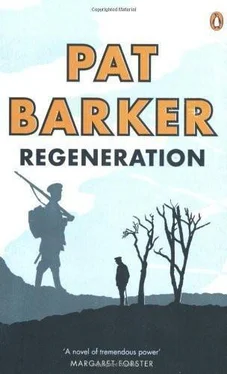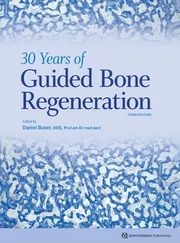He lay back and a moment or two later heard footsteps padding past the door of his room. Obviously Burns too had been woken up. Probably he was going downstairs to make himself a cup of tea, perhaps even to sit up the rest of the night.
The more Rivers thought about Burns sitting alone in the kitchen, the more he thought he ought to get up. The sounds of the storm had now been joined by running footsteps. He wouldn’t find it easy to sleep again anyway.
The kitchen was empty, and didn’t seem to have been disturbed since last night. He told himself that he’d been mistaken, and Burns was still in bed. By now rather anxious, perhaps unreasonably so, he went upstairs and peered into Burns’s room. The bedclothes had been pushed back, and the bed was empty.
He had no idea what he should do. For all he knew midnight walks — or rather three am walks — were a habit of Burns’s when the nights were particularly bad. Surely he wouldn’t go out in this. Rivers heard shouts, followed by more running footsteps. Obviously other people were out in it. Quickly, he returned to his own room, pulled on socks, boots and coat, and went out into the storm.
A small group of figures had gathered round the lifeboat, three of them holding storm lanterns. The overlapping circles of light shone on yellow oilskins glistening with wet, as the men struggled to clear the shingle from the planks that were used to launch the boat. Silver rain slanted down into the lighted area, while beyond, pale banks of shingle faded into the darkness.
A knot of bystanders had gathered by the hut, separate from the labouring figures around the boat. Convinced that Burns must be among them, Rivers ran across to join them, but when he looked from face to face Burns was not there. A woman he thought to be familiar, but couldn’t immediately identify, pointed to the marshes south of the town.
As he turned and began walking quickly towards the marshes, he was dimly aware of the boat hitting the sea, and of the waves surging up around her. He left the shelter of the last houses, and the wind, roaring across the marshes, almost knocked him off his feet. He dropped down from the path and walked along beside the river where he was slightly sheltered, though the wind still howled and the yacht rigging thrummed, a sound like no other he had ever heard. He could see fairly clearly most of the time. Once, the moon freed itself from the tatters of black cloud, and then his own shadow and the shadow of the tower were thrown across the gleaming mud.
Looking at the tower, Rivers thought again how squat and unimpressive it was, and yet how menacing. A resemblance that had merely nagged at him before returned to his mind with greater force. This waste of mud, these sump holes reflecting a dim light at the sky, even that tower. It was like France. Like the battlefields. A resemblance greater by night than by day, perhaps, because here, by day, you could see things grow, and there nothing grew.
— They were always afraid we’d get trapped in the cellars.
— I suppose they flood, don’t they? At high tide?
Rivers climbed on to the path, trying to work out where the tide was and whether it was rising or falling, but he could hear only the crash of breaking waves and feel the drizzle of blown spume on his face. In spite of his mud-clogged boots and aching thighs, he started to run. As he neared the tower, a stronger blast of wind sent him staggering off the path. He was slithering and floundering through mud, calling Burns’s name, though the sound was snatched from his mouth and carried off into the whistling darkness.
He slid down on to the beach. An outgoing wave sucked shingle after it, but the entrance to the moat was clear. He hesitated, peering into the darkness, afraid that an unusually powerful wave might trap him in there. He called ‘David’, but he knew he couldn’t be heard and would have to go down, into the black darkness, if he were ever to find him.
He groped his way into the moat, steadying himself against the wall. It was so wet, so cold, so evil-smelling, that he thought perhaps the tide had already reached its height and was now falling. At first he could see nothing, but then the moon came out from behind a bank of cloud, and he saw Burns huddled against the moat wall. Rivers called ‘David’ and realized he was shouting when there was no need. Even the howl of the storm sounded subdued in the shelter of the moat. He touched Burns’s arm. He neither moved nor blinked. He was staring up at the tower, which gleamed white, like the bones of a skull.
‘Come on, David.’
His body felt like a stone. Rivers got hold of him and held him, coaxing, rocking. He looked up at the tower that loomed squat and menacing above them, and thought, Nothing justifies this. Nothing nothing nothing. Burns’s body remained rigid in his arms. Rivers was aware that if it came to a fight he might not win. Burns was terribly emaciated, but he was also thirty years younger. His surrender, when it came, was almost shocking. Suddenly his body had the rag-doll floppiness of the newborn. He collapsed against Rivers and started to shake, and from there it was possible to half lead, half push him out of the moat and up on to the relative safety of the path.
At the kitchen table, wrapped in a blanket, Burns said, ‘I couldn’t seem to get out of the dream. I woke up, I knew I was awake, I could move and yet… it was still there. My face was dripping. I could taste it.’ He tried to laugh. ‘And then the bloody maroon went off.’
There were no electric lights. The power lines must be down. They were talking by the light of an oil lamp that smoked and smelled, and left wisps of black smoke like question marks on the air.
‘I think we can do without this now,’ Rivers said, walking across to the window and pulling the curtains back. He opened the windows and shutters. The storm had almost blown itself out. A weak light seeped into the room, falling on Burns’s red eyes and exhausted face.
‘Why don’t you go to bed? I’ll bring you a hot-water bottle if you’ve got such a thing.’
Rivers saw him settled into bed. Then he went out to the butchers in the High Street, which he’d already noticed was surprisingly well stocked, bought bacon, sausages, kidneys, eggs, took them home and fried them. As he was spooning hot fat over the eggs, he remembered his reaction when he was looking up at the tower. Nothing can justify this, he’d thought. Nothing nothing nothing. He was rather glad not to be faced with the task of explaining that statement to Siegfried.
He sat down at the table and began to eat. He was still chasing the last dribble of egg yolk with a triangle of toast when Mrs Burril came in. She looked at the plates. ‘Cracked, did you?’ Two unpacked bags later she added, ‘Thought you might.’
‘Is the boat back?’
‘Not yet. I keep busy.’
Rivers went upstairs to check on Burns and found him still asleep. The room was full of books, stacked up on tables and chairs, spilling over on to the floor. Church architecture, country crafts, ornithology, botany and — a slight surprise — theology. He wondered whether this was an expression of faith, or a quest for faith, or simply an obsession with the absence of God.
One of the reasons the books had to be stacked on tables and chairs was that the bookcase was already full of other books: boys’ annuals, the adventure stories of Henty, Scouting for Boys. Games too: Ludo and Snakes and Ladders, a bat for beach cricket, collections of pebbles and shells, a strip of bladderwrack. All these things must have been brought here, or collected here, summer by summer, and then outgrown, but never thrown away, so that the room had become a sort of palimpsest of the young life it contained. He looked at Burns’s sleeping face, and then tiptoed downstairs.
Читать дальше












